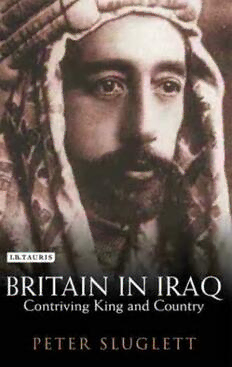
Britain in Iraq: Contriving King and Country (Library of Middle East History) PDF
Preview Britain in Iraq: Contriving King and Country (Library of Middle East History)
PREFACE TO THE SECOND EDITION i BRITAIN IN IRAQ ii BRITAIN IN IRAQ Für Marwan und Shaalan, noch einmal PREFACE TO THE SECOND EDITION iii BRITAIN IN IRAQ Contriving King and Country P S ETER LUGLETT iv BRITAIN IN IRAQ Published in 2007 by I.B.Tauris & Co Ltd 6 Salem Road, London W2 4BU 175 Fifth Avenue, New York NY 10010 www.ibtauris.com Copyright © Peter Sluglett, 2007 The right of Peter Sluglett to be identified as the author of this work has been asserted by the author in accordance with the Copyright, Designs and Patent Act 1988. All rights reserved. Except for brief quotations in a review, this book, or any part thereof, may not be reproduced, stored in or introduced into a retrieval system, or transmitted, in any form or by any means, electronic, mechanical, photocopying, recording or otherwise, without the prior written permission of the publisher. Library of Middle East History 12 HARDBACK ISBN: 978 1 85043 769 7 PAPERBACK ISBN: 978 1 85043 770 3 A full CIP record for this book is available from the British Library Printed and bound in Great Britain by TJ International Ltd, Padstow, Cornwall From camera-ready copy edited and supplied by the author PREFACE TO THE SECOND EDITION v CONTENTS Notes on Transliteration vii Abbreviations viii Foreword by Albert Hourani ix Preface to the Second Edition xi Preface to the First Edition xv Maps xvii Introduction 1 1 From the Outbreak of War to the Cairo Conference, 1914–1921 8 2 From the Cairo Conference to the Ratification of the Anglo-Iraq Treaty, March 1921 – September 1924 42 3 Oil, Boundaries and Insolvency: Political and Economic Problems, 1924–1926 65 4 The Years of Frustration, 1926–1929 93 5 Prelude to Independence, 1929–1932 121 6 Tenurial, Revenue and Tribal Policy 161 7 Defence and Internal Security: The Role of the Iraq Army and the RAF 182 8 Educational Policy 193 9 The Mandate and its Legacy 210 Appendix I: A Note on Shi‘i Politics 219 Appendix II: Tenurial and Taxation Arrangements in ‘Amara Liwa Under the Mandate 233 Notes 245 Bibliography 289 Index of Persons and Places 305 Index of Subjects and Themes 313 vi BRITAIN IN IRAQ PREFACE TO THE SECOND EDITION vii A NOTE ON TRANSLITERATION 1. Transliteration has been kept as simple and consistent as possible; ‘ has been used for ‘ain, and ’ for hamza. No subscript or superscript marks or have been used. 2. When an Arabic word or name has a form which has been commonly accepted in English it has not been put into italics. Less common or technical terms (e.g. muqata‘a, sirkal) are in italics throughout. 3. Kurdish, Persian and Turkish proper names, and some Arabic names which I have not seen written in Arabic but which appear in British sources, have been copied from the Police Intelligence Reports in the form in which they are most commonly found. viii BRITAIN IN IRAQ ABBREVIATIONS Air Air Ministry Files, Public Record Office, London. BHCF Baghdad High Commission File, National Archives of India, New Delhi. CO Colonial Office Files, Public Record Office, London. DBFP Documents on British Foreign Policy. FO Foreign Office Files, Public Record Office, London. LP & S India Office: Letters, Political and Secret, India Office Records, British Library, London. PREFACE TO THE SECOND EDITION ix FOREWORD by Albert Hourani The British ruled Iraq from the First World War until 1932, and the way in which they ruled was widely regarded as being new. They exercised authority, under mandate from the League of Nations, by means of the RAF, a network of advisers and officials in government departments, and control of the country’s most important economic resource, oil, and they used this authority in order to create an administration and a political order which would in the long run be able to stand by themselves. It was generally thought at the time that the experiment was successful, and by 1930 the British Government believed itself to be in a position to assure its essential interests through a treaty negotiated between equals, and to recommend to the League of Nations that the mandate should be ended and Iraq admitted to membership. The sense of having done well which was widespread among British officials and politicians was shared by the most influential Arab political writer of the time, George Antonius. In his Arab Awakening published in the 1930s in circumstances which led him to emphasize the contrast between what Britain had done in Iraq and what France had not done in Syria, Antonius wrote in warm terms of the efforts and devotion of ‘an unusually capable and conscientious band of British Officials’ and of Iraq’s good fortune that ‘in many important respects, Great Britain’s interests marched with her own’. In the post-imperial age, we are perhaps less inclined to believe that there can be a pre-established harmony between the interests of different peoples, or even that it is possible to speak of a whole people as having a single interest. Whether or not we are inclined to make judgements, we at least want explanations of the way in which policies were formed, the means by which they were carried out, and their effects on different sections or strata of society. Dr. Sluglett’s careful study, based on a wide range of unpublished
